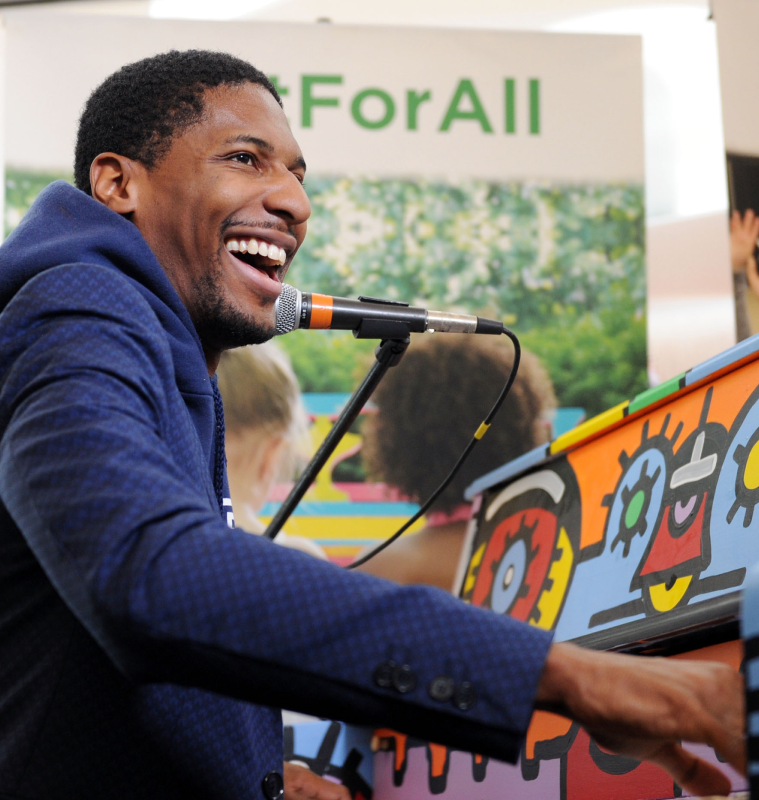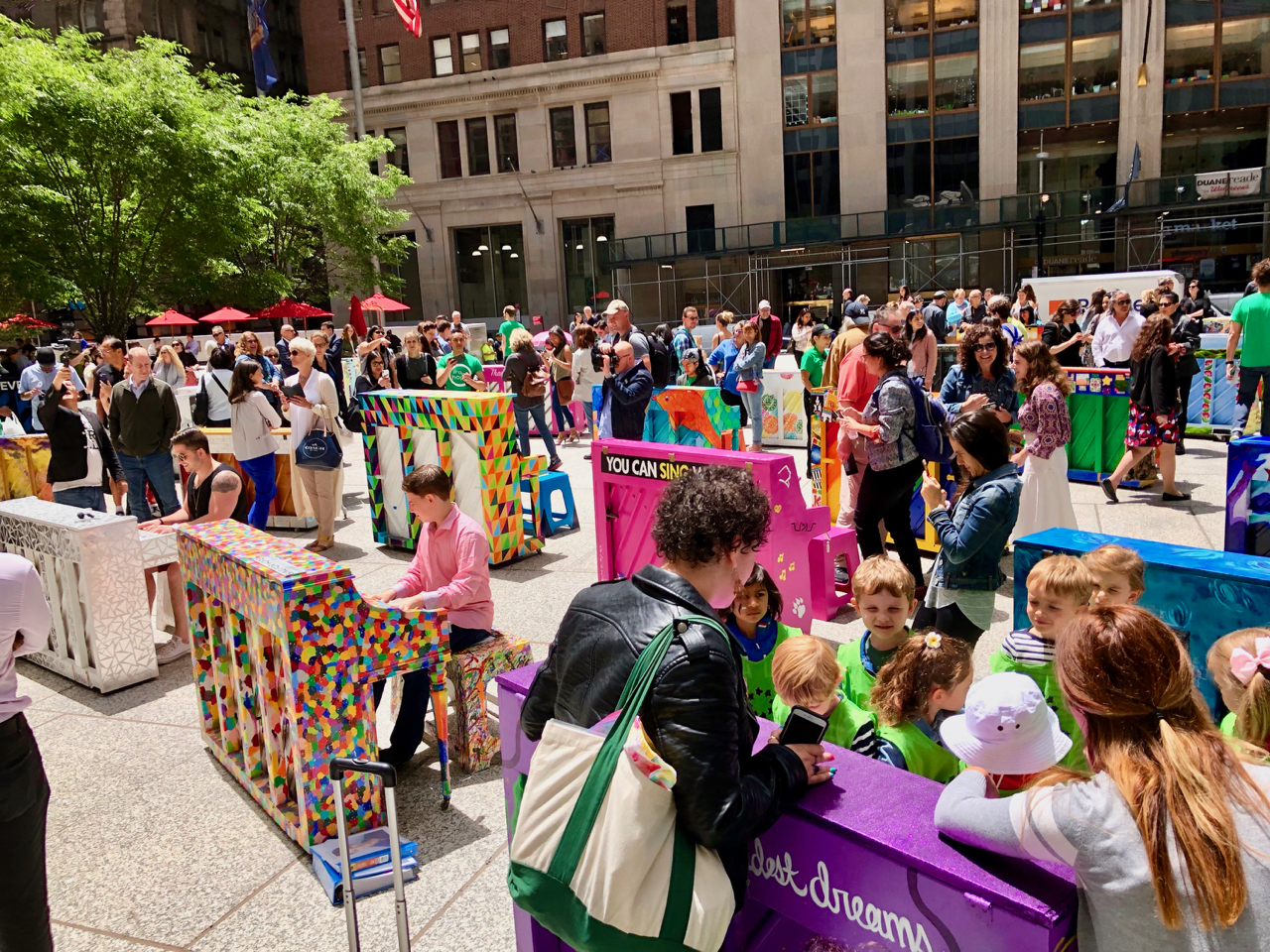
"We bring these Sing for Hope Pianos to our shared streets and public spaces because the context of where you experience art and music can profoundly change you. Public sharing of art fosters and affirms community. It's what we need right now, what the world needs. And as a Sing for Hope board member, I love that we celebrated World Piano Day by launching in my hometown of New Orleans!"
Sing for Hope harnesses the power of the arts to create a better world. Our creative programs bring hope, healing, and connection to millions of people in hospitals, schools, care facilities, refugee camps, transit hubs, and community spaces worldwide. A non-profit organization founded in New York City in response to the events of 9/11, Sing for Hope partners with hundreds of community-based organizations, mobilizes thousands of artists in creative service, and produces artist-created Sing for Hope Pianos across the U.S. and around the world. The official Cultural Partner of the World Summit of Nobel Peace Laureates, Sing for Hope champions art for all because we believe the arts have an unmatched capacity to uplift, unite, and heal.
 Sing for Hope Piano by Paul Motisi
Sing for Hope Piano by Paul Motisi Each piano is a unique, individually credited work of art created by a dedicated artist or artists' group chosen through an open application process.
All of our artists and partners share our belief in "art for all" and our mission of creating a better world through the arts, championing diversity, equity, and joy through the arts.
Each piano is a hub of community-building that forms part of a year-round continuum of arts outreach to communities in need. The Sing for Hope Pianos' time outdoors is limited to several weeks so that they can survive the elements and live on to brighten lives for years to come in our partner schools, hospitals, and community-based organizations.

Artists from your community apply to paint a Sing for Hope Piano through our RFP (Request for Proposal) process. Each selected artist receives a $1,000 honorarium for their work.

Artists work together in a communal studio, where we provide the paint, brushes, and all the supplies they'll need to bring their visions to life. Artists routinely tell us that this opportunity to work in the same space with other artists is one of their favorite parts of the program.

Once completed, the new Sing for Hope Pianos are unveiled at a public launch event, where they are all featured in one place for a musical celebration open to the public. This is a great press opportunity for your organization, city officials, donors, and other dignitaries.
.png)
After the Launch Event, all of the Sing for Hope Pianos are moved to their outdoor locations in high-traffic areas for anyone and everyone to play. The Sing for Hope Pianos are protected from the elements by their own custom rain covers. We have found that 3 weeks is the perfect length of time to ensure that all of the Sing for Hope Pianos survive outdoor conditions and are still strong enough to live long lives in their future homes.

Through another RFP process, local schools may apply to receive a Sing for Hope Piano for their students to use for years to come. A ribbon-cutting ceremony at each permanent location is another great press opportunity for your organization and public officials.
When you partner with us to produce the Sing for Hope Pianos in your community, we give you all the tools you need to successfully run the entire program from start to finish. We will help you with budgeting, timeline, hiring, materials, planning, site selection, artist recruitment, artist training, special event run-of-shows, moving schedules, and planning your ribbon-cutting ceremonies at final donation sites. We’ve done it all so many times that we have developed systems, procedures, and best practices for each step of the process. And to make it even easier, we’ve already pre-written all your emails, designed all your templates, and assessed every risk you never even thought of. This is a turn-key solution to creating, running and managing the entire program from start to finish, and you'll still have access to our expert team to help along the way.
Automated budget templates and real-time tracking
Schedule generator with integrated milestones
Guidelines for hiring and automated onboarding
Customized pre-sourcing and logistics planning
Interactive tools and optimal site criteria
Recruitment system and training modules
Run-of-show templates and ceremony planners
Email templates and automated reminders
Risk management tools and crisis protocols
We give you all the materials – including the unpainted pianos, professional grade paint, studio supplies, custom benches, requisite signage, rain covers, locks, and more. We'll also take care of paying the artists' honoraria.
.png)
What you'll supply is the space and the people power. Someone to manage the project using our platform (which will walk you through every step), a studio manager, local piano tuners, piano movers and space to do the project.

If you’re thinking about the Sing for Hope Pianos in your city, we have found that it’s best done as a local three-pronged partnership between an arts organization, city government, and a partner working within the local school system. Sometimes, one partner may check two of these boxes, such as an arts organization with a strong educational outreach program.
One partner will need strong ties to the arts community. You’ll need to recruit a number of visual artists to apply to paint pianos. And when the Sing for Hope Pianos are outside in their public exhibition, you’ll want to engage arts groups to perform and engage with their local communities. We encourage solo pianists, singer/songwriters, duets, trios, small ensembles, and even large choruses to take advantage of the opportunity to perform outdoors and invite their friends and fans. It is our goal for the Sing for Hope Pianos to engage as much of the community as possible. Place a Sing for Hope Piano in an outdoor location near a senior center, and you’ll be able to invite their residents to an outdoor concert. A Sing for Hope Piano placed near a school is a great opportunity for the school chorus to get to perform outdoors. Just be mindful of local ordinances related to noise limitations and large gatherings. And that brings us to our second partner.
You will want at least one partner from the city you’re working in. In New York City, for example, we work primarily with NYC Parks and the Department of Transportation, and they help us navigate a lot of the city regulations. In Los Angeles, we partnered with the Community Services Department for the City of Beverly Hills, and in New Orleans, our city partner is New Orleans Parks & Parkways. Having someone in the city government will help clear a number of hurdles and can fast-track permits and approvals. The city partner will connect you to someone who can direct you to locations where you can place Sing for Hope Pianos in public spots where gatherings will not be a problem. Parks are ideal for this, but city sidewalks are not. In NYC, if we want to put a Sing for Hope Piano on a sidewalk, we have to go through a separate office for “Coordinated Street Furniture,” which issues permits for things like bus shelters, newsstands, and sheltered bike parking. In some cases, we also must pull permits from the NYC Police Department if we expect a crowd at a particular location. Having a partner within your city government will help facilitate all the necessary permits in question.
And finally, we like to have a partner with a strong educational component. Because we like our Sing for Hope Pianos to end up in local schools, having access to teachers and school administrators is paramount to our success. In Los Angeles, our education partner was the Wallis Annenberg Center for the Performing Arts. They ticked two boxes for us – an arts partner with strong ties to the local arts community and an educational partner, as they have programs within the LA Unified School District. In New Orleans, we partner with the Jazz Museum of New Orleans, which is strongly integrated into the local arts community and has its own school outreach program with deep connections with the local school district.
Now that you understand the basics, we'd love to help you plan your Sing for Hope Pianos project in more detail and map out a realistic timeline. For next steps, please visit our contact page to get in touch with our team.